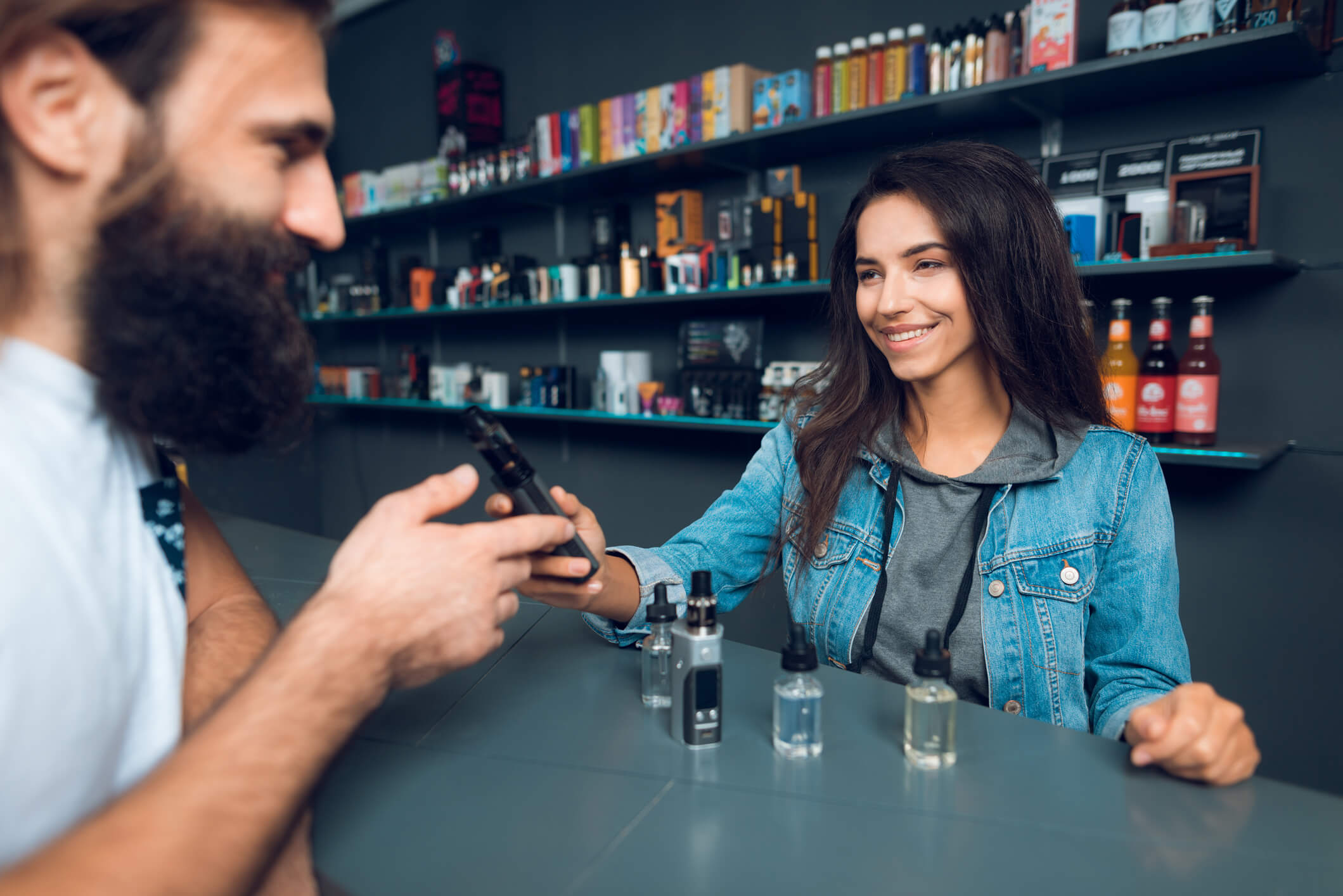
February 10, 2020

Vape shops have got an image problem. In many ways these battlegrounds in the war against smoking should be cherished as places where brothers, wives, best friends and colleagues go to kick the habit. A poll by Nationwide Building Society last month painted a very different picture, however.
Vape shops, it appears, are right down there with betting shops when it comes to what shoppers want to see on their high streets. Nearly three-quarters of us still see our high street as an important local amenity but nearly a third want to see fewer vape shops there.
What’s gone wrong and the how does the industry turn it around?
“The presentation in many vape shops can be poor to average,” says Mark O’Dolan who mentors businesses through his firm High Street Mentor. “Today’s consumers expect high standards and exceptional service and it’s not good enough to offer something that may well be in demand in a shabby retail concept,” he adds.

For a category that has suffered health scares in the US and bad media coverage everywhere else, poor in-store standards aren’t an option.
“Handwritten signs in a grubby, boring shop simply says, ‘We have no idea and don’t trust us; we are here making a quick buck,’” Mark says.
Not everybody agrees with this picture of the industry and John Dunne, director of the trade body the UKVIA, says vape shops have had a positive effect on local economies:
“Vape stores are one of the things that are regenerating the high street. What I would say is that we have seen a change in what the shops look like with more of the chains becoming more upmarket, with clean Apple-type looks which are more inviting.”
The changes that Dunne alludes to have been driven in some part by a new breed of large-scale operators who have gained industry plaudits for improving customer experiences in vape shops.

Doug Mutter, director of VPZ, is at the helm of just such a retailer. The company is currently six months into a three-year expansion which will see 1,000 jobs created and 200 new shopfronts added to its 125-store estate. He recognises the bad vape shop stereotype but thinks the industry has already moved on.
“It is a very young industry so, when it was in its infancy, I think a lot of businesses thought they just had to open a shop and people would come flooding in. Those tend to be the businesses which are no longer around.”
As the company’s expansion plans show, Mutter is positive about the future and sees a lasting place for the vape shop on British high streets.
“At VPZ, we invest and focus heavily on two key areas to provide the best experience for our customers. The first is staff training – we pride ourselves on having the most knowledgeable staff on the high street.
“To make this possible every member of our team spends two weeks at our Edinburgh HQ where we go through the entire process, beginning with how we manufacture our products right up to consumer trends and how this can change depending on where customers are on their vaping journey,” he says.
The year of bad headlines about vaping only makes this customer expertise more essential:
“Customers come into our stores with questions beyond simply ‘what product should I have?’. They want to know the best tips for maintaining devices, how to handle their cravings and even what next steps they should take on their stop smoking journey. Trust is critical.”
Then there is the issue of safety – now more important than ever in the industry.
“The second area we focus on is our product quality and range,” says Mutter. “We test every single product in our store for quality and safety standards. If it fails to meet our standards, we do not stock it.”
In fact, far from the messy, hippy images the classic “bad” vape shop might conjure up, Mutter thinks the modern vape shop needs to have the credibility levels of a healthcare business.
“Vaping retailers, like pharmacies, sit in between providing a retail experience and practical health guidance. We do not just provide products to people; we provide them with years of experience and knowledge which, in turn, helps them make more informed choices and better health decisions. Building this reputation takes time and if your objectives are just to make money then you will fail,” he adds.
It’s a model which Mutter and his peers will hope turns the vape shop’s reputation around. There are other ways the industry is looking to contribute to the communities it operates in, too.

“We run a number of local community projects with our stores which has been our way of giving back. We run local high street clean-ups when we open a new store to help make the street more appealing. On a nationally level, we have started working with local NHS trusts to help the most vulnerable people in our society have access to our services to help them quit cigarettes in a safe and secure environment. Indeed, our partnership with NHS Lewisham has just been expanded so that we can now offer this service in care homes, off-site NHS facilities and community outreach programmes.”
Last month, John Dunne told Vape Business that most entrepreneurs had got involved with vaping to have a positive impact on people’s lives. There is a flash of this zeal in the way Mutter describes VPZ’s good works.
Nonetheless, threats still remain for even the most benevolent and well-run vape store.
First are the plethora of online vape shops. Like other industries, online businesses which can stock a wider range and which lack the costs of a bricks-and-mortar store present an existential threat to vape shops.
Mark O’Dolan says the internet makes vape shops particularly vulnerable if they offer sub-standard service: “Why bother when you can sit back at home or in your favourite coffee shop and order it online?”
Increasingly, however, the threat also comes from local shops who, having seen decades of declining tobacco sales, see the vape market as a once-in-a-generation opportunity to transform their revenue.
If customers have been picking up 20 Lambert & Butler a day from their local shop for years, why not pick up their e-liquids or cartridges too?
Amish Shingadia, who owns Londis Caterways in Sussex, saw off competition from a nearby vape shop which subsequently went out of business. Unsurprisingly, he thinks a modern convenience store has the upper hand over more specialist businesses.
“Vape shops have to take full ranges, dictated by corporations – we can cherry pick and stock the bestsellers for our demographic. And because we don’t just rely on this category, we can also offer cheaper prices,” he says.
Shingadia also believes that the experience of a specialist vape shop can be intimidating to customers – a point you hear again and again in the industry: “Products are locked away, there are barriers to sale and they don’t seem to offer the same kind of multi-buy deals we can.”
He also identifies clear-cut pricing, longer hours and better availability as reasons his business won out.
“I’m not sure vape shops have a shelf life as convenience stores move in – particularly with online sales providing a threat too,” he says.
“Vape stores can spend more time talking through products but, once customers have that knowledge, they can just come to us. Gradually, I think a lot of vape shops will disappear”.
Unpopular on the high street and under threat from competitors – is this really the end for the vape shop?
Not so quick, says Mark O’Dolan.
“My view is there is enormous growth opportunity in the vape market for shop concepts that deliver an exciting crisp and clean ambience that don’t just look like the typical vape shop and are a pleasure to visit.”
And while he’s critical of the “bottom of the barrel” retailers, he casts doubt on the Nationwide survey’s inference that there are too many vape shops on our high street:
“There are thousands of coffee shops and new ‘foodie’ businesses on the high street and nobody says there are too many of them. I think what the recent poll is actually saying is there too many vape shops on the high street that are boring and unexciting.”
A mix of great and improving retailing and a category still in huge growth means talk of the death of the vape shop might just be a little premature.
Lessons for your business
Mark O’Dolan – co-founder, Highstreet Mentor
Doug Mutter – director, VPZ
From the 18th -20th February Mark O’Dolan is presenting ideas to the retailers at the Madison biggest UK in-house trade show for the cycling industry http://www.icebike.co.uk/